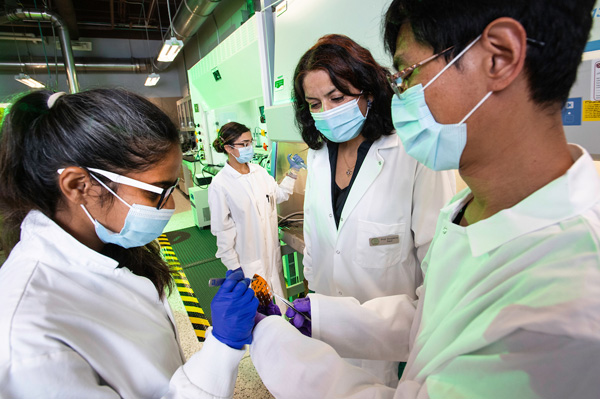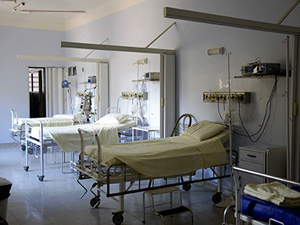|
|
|
|
|
|
 |
|
Shaping the future: UNT engineers awarded $2.4 million in federal grants for innovative research
Science is driving innovation at UNT's College of Engineering, where knowledge is a pathway and ideas become answers. Four new federal grants will fund UNT engineers' research to shape solutions for the future. Assistant professor of electrical engineering Hua Sun is researching private information retrieval -- sending and receiving information online without any search engine tracking that data -- through a study funded by a $220,000 National Science Foundation grant. Additionally, three teams from the Department of Materials Science and Engineering have received Department of Defense grants for their research. Professors Srinivasan Srivilliputhur, Rajarshi Banerjee and Michael Baskes, are working to better understand how metal alloys function at the atomic level with a $1 million grant from the U.S. Air Force Office of Scientific Research, while Diana Berman, Samir Aouadi and Andrey Voevodin are using tribology -- the study of friction -- to rethink the combustion engines that power durable unmanned aerial Army drones with a $780,000 grant from the Army Research Laboratory. Professor Anupama Kaul, pictured with student researchers, directs UNT's Nanoscale Materials and Devices Lab and the PACCAR Technology Institute, and is working to develop new solar cell technology for the Office of Naval Research through a $474,000 grant, utilizing perovskite materials that are extremely efficient at absorbing incoming light.
|
|
|
|
|
|
|
|
 UNT and HSC professors find private hospital rooms associated with fewer MRSA infections UNT and HSC professors find private hospital rooms associated with fewer MRSA infections
Professors from the University of North Texas and the University of North Texas Health Science Center at Fort Worth have published a study of more than 300 Texas hospitals that showed patients were dramatically less likely to be infected with hospital-acquired methicillin-resistant Staphylococcus aureus in hospitals with more private patient rooms. The study compared private patient rooms to multi-occupancy rooms, hospitals in rural locations and urban locations, ethnicity of patients, insurance status, number of nurses per patient and other factors. Additionally, the study found that hospitals with lower percentages of private patient rooms treated a higher number of patients without private insurance coverage.
|
|
|
|
|
|
| Combining stress signals |
A new study published in the Proceedings of the National Academy of Sciences co-led by Rajeev Azad, associate professor of bioinformatics, looks at how plants respond to different types of stress at the same time -- something that previously has not been studied in depth. A better understanding could help develop more resilient plants, which is much needed as climate change continues to accelerate. Azad, who is passionate about providing students research experiences, recently was awarded the 2020-21 Millicent and Eugene Faculty Mentoring Award from the Texas Branch of the American Society for Microbiology.
|
|
|
|
|
|
|
| Providing new environmental research opportunities |
|
A major anonymous gift will provide upgrades to UNT's Advanced Environmental Research Institute's Water Research Field Station, including a permanent lab facility and educational resources. While the facility has 24 experimental streams and 46 ponds used in aquatics research, it lacks a physical building to conduct research or classes. "With this incredible donation, we're now able to make improvements that will allow us to perform more long-term research projects, expand our educational resources and explore collaborative studies with other disciplines. The laboratory and additional workspaces are going to be a huge game changer for water research at UNT," Aaron Roberts, director of AERI, says.
|
|
|
|
|
|
|
| Studying home buyouts in areas hit by natural disasters |
|
Elyse Zavar, who studies the role of home buyouts in disaster recovery and hazard mitigation, has been recognized as one of the top scientific leaders researching ways to improve the wellbeing of coastal communities and ecosystems. Zavar, assistant professor of emergency management and disaster science, was selected as a 2020 Early-Career Research Fellow by the Gulf Research Program of the National Academies of Sciences, Engineering and Medicine. Her research focuses on buyouts -- federally funded land purchased to relocate residents out of high-risk areas like floodplains or hurricane-impacted coastlines, most recently in areas of Harris County hit by Hurricane Harvey.
|
|
|
|
|
|
|
| Developing code for DIY 3D printed mask and nose plugs |
|
Yijie Jiang, assistant professor of mechanical engineering, and his students have developed open source codes for a new mask and nose plug that use smart technology to respond to a wearer's breathing. The team started the project in early May to help the general public combat the COVID-19 pandemic. The masks and nose plugs are designed with an array of channels that include curved micropillars in each channel that move inward or outward as a person breathes. The fully customizable masks and nose plugs can be printed with at-home 3D printers from commercially available materials, like silicone.
|
|
|
|
|
|
|
| Examining student literacy improvement from technology use |
|
Assistant professor of teacher education and administration Lauren Eutsler is dedicated to improving student literacy by examining how to better use technology in the classroom and at home. She recently examined instances where pre-kindergarten through fifth-grade teachers used mobile technology to improve students' literacy achievement. She identified gains in several areas, including better comprehension for bilingual students who combined reading digital books with apps that provide recording and listening features. The study found strategies for teachers to use that can make the most out of using technology remotely to create student-centered learning.
|
|
|
|
|
|
|
| Solving the painted bunting mystery |
|
Practicing utmost safety in the midst of the COVID pandemic, UNT ecology researchers continued investigating the mysterious nesting habits of the painted bunting at the Lewisville Lake Environmental Learning Area this summer. Though this species of bird is popular for its brilliant "nonpareil" color pattern exhibited by the adult males, its breeding ecology has been surprisingly mysterious. James Bednarz, a senior lecturer and advisor in the Department of Biological Sciences, led the research team of students who have been uncovering answers regarding the birds' lesser-known characteristics.
|
|
|
|
|
|